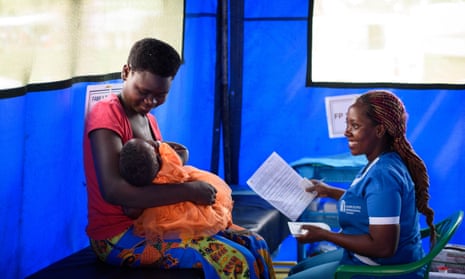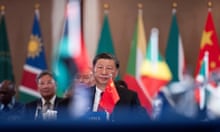British aid cuts have had a “devastating” effect on women and girls around the world, forcing sexual and reproductive health programmes to be cancelled, according to a new cross-party report by MPs.
The Commons international development select committee (IDC) said plummeting aid spending since 2020 had cost lives and endangered many more pregnant women, while abruptly cutting funding, often in mid-programme, had damaged relationships with partner organisations.
Nearly 300,000 women died during pregnancy and childbirth globally in 2020, according to the parliamentary committee, which said aid should be used to combat this problem, especially in sub-Saharan Africa where 70% of the deaths happened. It also said 2.4 million children died in their first year – most of them in sub-Saharan Africa or central and southern Asia.
Sarah Champion, the IDC chair, said: “A girl in South Sudan is more likely to die in childbirth than to finish secondary school. Even here in the UK maternal deaths are at their highest level in 20 years, but almost 95% of maternal deaths globally are in poorer countries.”
An analysis of the potential impact of government policy on disadvantaged groups, known as an equality impact assessment, presented to the Foreign, Commonwealth and Development Office in July 2023, warned that the cuts could mean nearly 200,000 more unsafe abortions were performed in Africa.
Champion, the Labour MP for Rotherham, said: “Last year’s equalities impact assessment from the FCDO showed the horrifying numbers of women and girls, thousands upon thousands, who will once again face unsafe abortions and who will die in pregnancy or childbirth as a direct result of the UK’s slashed aid spending.
“It is no good the new foreign secretary coming into parliament and declaring that the UK is still a global aid superpower when we are failing on funding commitments, failing to set or achieve meaningful targets on sexual and reproductive health and rights – failing women, girls and marginalised groups the world over,” she said.
The UK cut its official development assistance (ODA) from £11.7bn in 2019 to £7.6bn in 2022. Funding for sexual and reproductive health and rights (SRHR) was cut by a third.
MSI Reproductive Choices, which provides contraception and safe abortion services, said it experienced a 79% cut in funding from the FCDO between 2019-20 and 2023-24 for its women’s integrated sexual health programmes.
The UN population agency, UNFPA, had its funding for contraceptives and reproductive health supplies cut by 85% in 2021.
after newsletter promotion
The Commons committee called for the department to compensate for the damage that previous aid cuts had done by setting a minimum percentage spend of ODA on reproductive health. Programmes should be funded for at least five years to ensure stability, it added.
The report acknowledged that the government did increase its funding for several humanitarian crises in reaction to the equalities assessment, but did not say how much would be spent on SRHR.
On Monday, the Organisation for Economic Cooperation and Development confirmed that an all-time high in aid spending in 2022 was mostly due to increased in-country costs to support refugees and to support the Ukraine war. The UK spent 29%, or $4.54bn (£3.64bn), of its total aid budget on refugees in 2022, more than any other OECD member.
Halima Begum, chief executive of ActionAid UK, said a rethink was needed. “[Aid spending] is being more and more aligned to national strategic priorities of Britain rather than of [recipient] countries,” she said.
“It should not be focused on the needs of our government. The money spent on ODA should be spent on the needs of other countries,” Begum said. “We need to cast the net widely and look back to spending ODA funds on global inequality and growing levels of poverty.”
The FCDO said the government’s international development white paper, published last year, reiterated the UK’s “commitment to deploy policy and investment to defend strongly and to advance sexual and reproductive health and rights, including safe abortion”.
“The UK has long been proud to defend and promote universal and comprehensive sexual and reproductive health and rights and our support for the global financing facility for women, children and adolescents has helped hundreds of millions of individuals in over 35 countries to access vital services,” said a spokesperson.
Between 2025 and 2030, the UK has pledged £80m to the financing facility, a global partnership that fights poverty by advancing the health and rights of women, children and adolescents.








